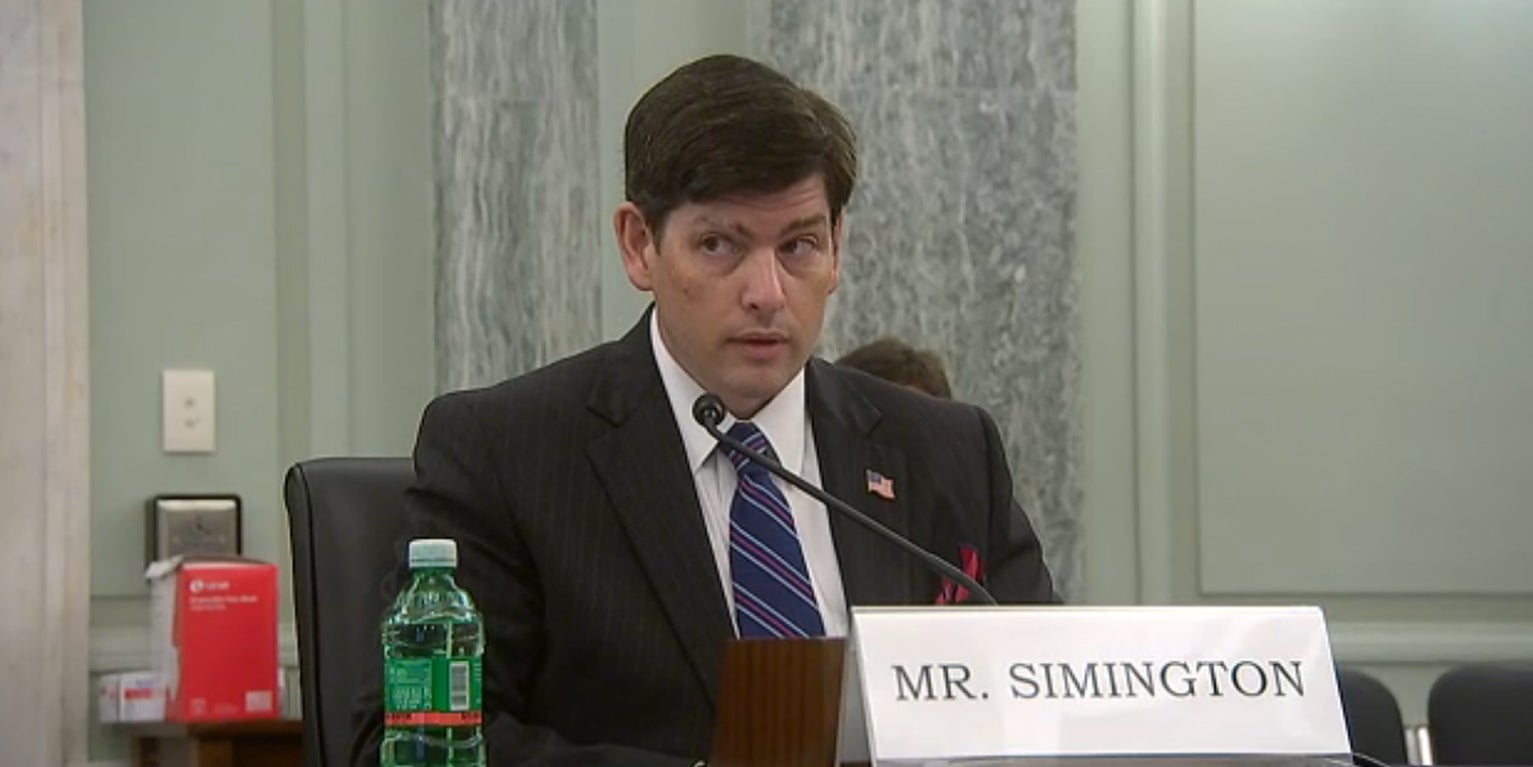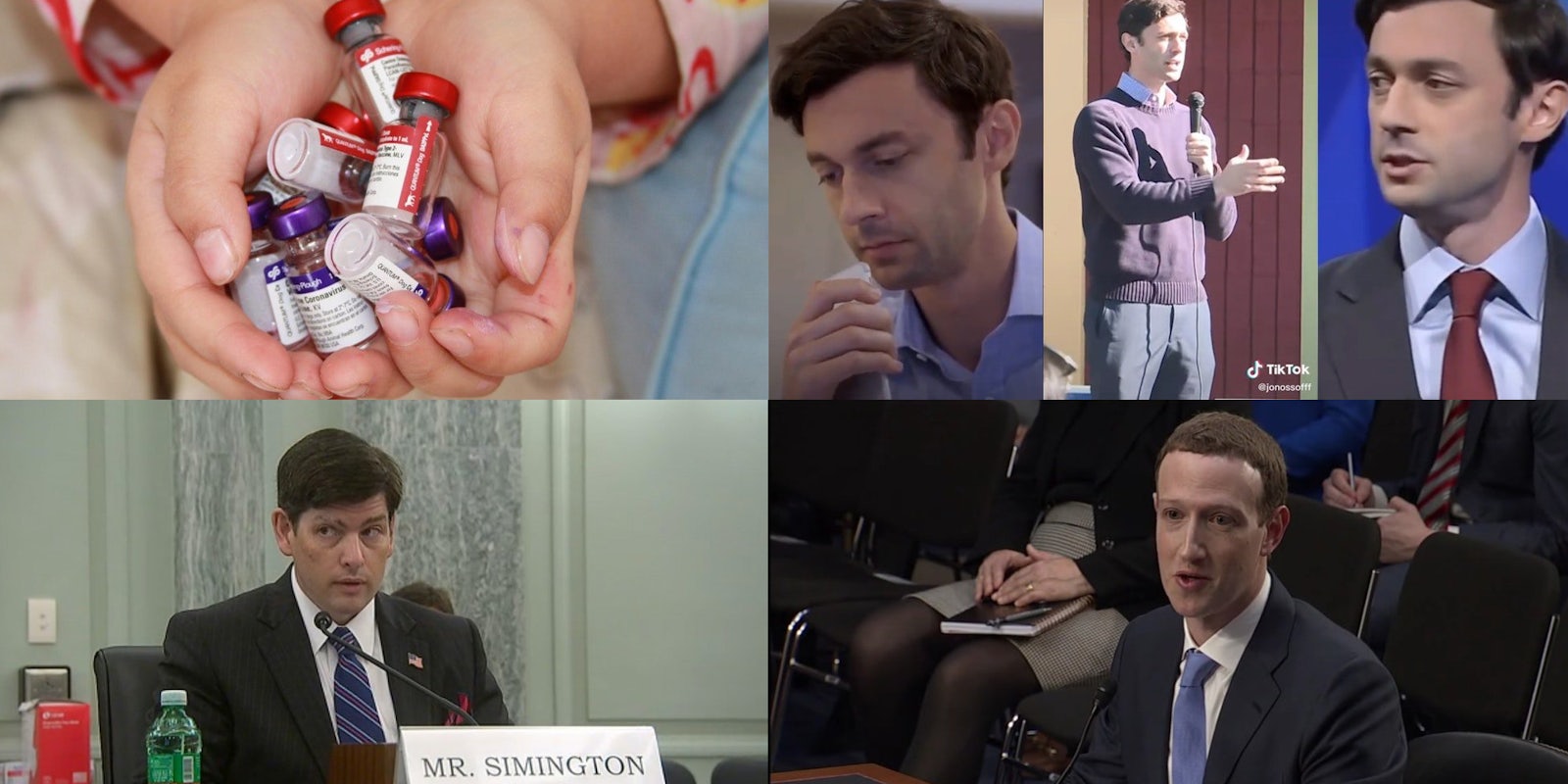Sign up to receive the best of the internet straight to your inbox.
Welcome to this week’s Tech Tuesday edition of the Internet Insider. The coronavirus vaccine has begun distribution, but YouTube has a lot of COVID-19 vaccine misinformation floating on the site.
Here’s what we’ve got on deck today:
- YouTube is struggling to keep COVID-19 vaccine conspiracies offline
- Jon Ossoff is popping off on TikTok
- Senate confirms Trump’s controversial FCC pick

BREAK THE INTERNET
YouTube is struggling to keep COVID-19 vaccine conspiracies offline
YouTube’s misinformation problem is so well-known it could be called notorious. Fortunately, the falsities that circulate there typically don’t have life-or-death consequences. COVID-19 vaccine disinformation is a grave exception—and it’s just a few clicks away on the world’s largest video hosting platform.
In October, it banned misinformation about the COVID-19 vaccine. Two months later, false and misleading videos about it persist. The Daily Dot found videos with hundreds of thousands of views that have been live for months.
“Warning – Do not take the COVID V@ccine [sic]” is one of many examples. The video opens with doomsday music and a man with a snow-white combover standing before a pulpit. Ominously, he intones, “Bill Gates and [Dr. Anthony] Fauci pushed Moderna’s Frankstein jab to the front of the line.” Cadence and volume rising, he continues, “Scientists and ethicists are sounding alarms.”
The video then introduces a clip of a viral video in which osteopathic physician Carrie Madej asserted—falsely—that the COVID-19 vaccine will change our DNA.
If all this sounds utterly divorced from reality, that’s because it is. The vaccine doesn’t alter DNA; people who receive it won’t be owned; and Dr. Fauci and Gates didn’t push Moderna’s vaccine, one of dozens, to the front of the line.
In spite (or perhaps because) of its science fiction-meets-religion style and whacky claims, “Warning – Do not take the COVID V@ccine” isn’t buried in obscurity. It’s got nearly 200,000 views. It’s not new, either. The video was posted in July. The channel that posted it, TruTeeVee, has 50,000 subscribers. This is among its most popular videos.
Vaccine disinformation is nothing new on YouTube. Nearly two years ago, the Daily Dot reported that its algorithm actually promoted it. Coronavirus misinformation is so irresistible that YouTubers have been known to use it simply to increase their views. So it’s not as if the company hasn’t been warned.
—Claire Goforth, contributing writer

SPONSORED
Like everything else this year, Secret Santa will be different than what we’re used to. If the idea of picking a gift for someone you hardly know is giving you stress, we’ve got you covered. Each of these gift items is designed to make your co-workers smile, whether it spruces up the office or just makes life easier. And thanks to Curbside Pickup from Sam’s Club, you can fill your cart without ever walking into a store.

POLI-TOKS
Jon Ossoff is popping off on TikTok
One of the Democrats in the Georgia Senate runoff race is taking over political TikTok.
Jon Ossoff is up against Sen. David Purdue (R-Ga.) in the state’s runoff, as neither candidate achieved 50% of the vote in November. Like other Democrat officeholders, Ossoff uses TikTok to inspire young voters. And he already has 1.9 million likes on the app.
The content ranges from dueting young content creators to clips from his campaign videos. Another video compiles Ossoff’s criticisms of Perdue captioned: “has anyone seen David Perdue?” And he has hopped on popular TikTok trends like “you have to stop” and “extremely rare aesthetic.”
Here’s why it matters: Ossoff is not the first to use TikTok to his campaign’s advantage. In Massachusetts’ Democratic primaries, Sen. Ed Markey (D-Mass.) galvanized young voters online in what became the “Markeyverse,” an online community tweeting Markey-themed memes and TikToks. One viral TikTok roasted his opponent, Joe Kennedy, for his wealth.
Much of the Markeyverse consisted of first-time voters. It’s likely Ossoff is trying to get the same youth momentum.
—Libby Cohen, contributing writer

OVERLORDS
Senate confirms Trump’s controversial FCC pick
The Senate voted to confirm Nathan Simington to the Federal Communications Commission (FCC), ending a nomination process that was fraught with controversy from the beginning.
The approval of Simington’s nomination could also have major ramifications for the agency moving forward.
The vote was 49-46, with Republicans voting in favor of Simington and Democrats voting against him. Two prominent Democrats, Sen. Ron Wyden (D-Ore.) and Sen. Richard Blumenthal (D-Conn.) raised concerns about Simington’s nomination with tech advocates ahead of the Senate’s vote along with a number of tech advocacy groups.
Simington’s nomination was marked with controversy because of his connections to President Donald Trump’s social media executive order that targets Section 230 of the Communications Decency Act, a vital internet law that shields websites from being liable over what is posted on them by third parties.
Here’s why it matters: Simington’s nomination to the FCC also could have consequences for President-elect Joe Biden.
With Simington headed to the FCC and Chairman Ajit Pai announcing that he will step down from the agency on Inauguration Day, it leaves the FCC facing a partisan 2-2 deadlock. The FCC is supposed to have five members, with three commissioners from the president’s party and two from the opposing party. The president also gets to choose who will serve as the chairperson.
However, if Republicans win the two Georgia runoff elections for the Senate, they will continue to control Congress’ upper chamber. That leaves the possibility that they could block, or stall, Biden’s nominee to fill out the five-person committee.
—Andrew Wyrich, deputy tech editor
BEHIND THE SEAMS
Batman has gone through numerous reboots and makeovers since his movie debut in 1943. In this YouTube video, we explore the bizarre history of his iconic costume. From spandex tights to kevlar body armor, the Batsuit tells us a lot about Hollywood’s attitude to superheroes. Is Batman a noir detective? A sex symbol? A violent antihero? The Batsuit’s story takes us on some surprising twists and turns, touching on government censorship, ’90s homophobia, and Zack Snyder’s unique attitude to action filmmaking.
BTW
- Gabbard teams with QAnon-supporting lawmaker for Section 230 repeal 🙃
- Government calls on Facebook and Instagram to be broken up in lawsuit 🔨
- The Lincoln Project’s election ads were largely useless, study finds 🤷
- Katie Porter blows up McConnell’s reason for stopping COVID-relief bill 💥
- Voting company hit with right-wing conspiracies threatens defamation suits ⚖️


